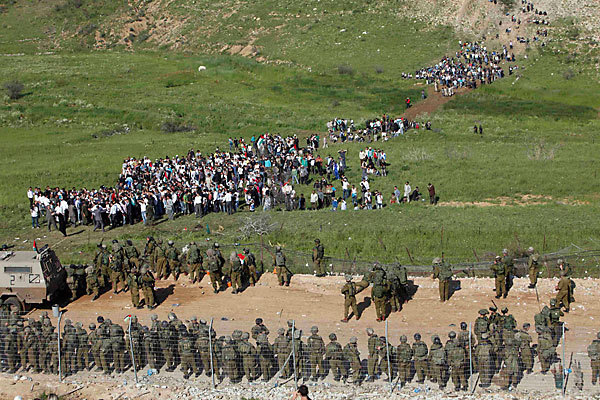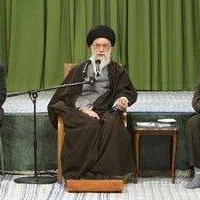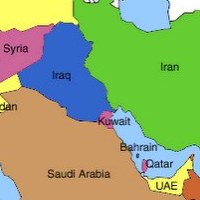![]()
Sun, May 22, 2011 | The Meir Amit Intelligence and Terrorism Information Center

Israeli soldiers stand guard during a demonstration by Syrian protesters marking "Nakba Day" on the border between Syria and Israel near the Druze village of Majdal Shams in the Golan Heights. (Nir Elias / Reuters)
Nakba Day as Seen by Iranian Press: “Arab Spring has come to Palestine”
This week the Iranian press has widely reported the Nakba Day events, even though they were relegated to a relatively marginal place compared to the coverage of domestic political happenings in Iran.
Editorials in major conservative newspapers were dedicated to the anniversary of the State of Israel’s establishment, and non-surprisingly expressed Iran’s official, well-known stance towards Israel and the Israeli-Palestinian conflict. The Iranian press claimed that this year’s Nakba Day events reflected the key position of the Palestinian issue on the regional agenda amidst the wave of popular uprisings that spread across the Middle East and North Africa in recent months.
An editorial published by the conservative daily Keyhan on the anniversary of “the formation of the illicit seed known as the false, barbaric Zionist regime” said that the 63rd Nakba Day was unlike all the other anniversaries of Israel’s establishment marked before. The Palestinian-led struggle against the Zionists has endured for years, and in recent years there has been more evidence for the coming death of the “Zionist regime”. The recent developments in the Middle East and North Africa, however, have been a catalyst for the process of Israel’s death. After six decades of crime, bloodshed, and considerable efforts towards the realization of the slogan “from the Tigris to the Euphrates”, the Zionists are currently facing despair and helplessness. Faced with the Islamic awakening, the Israelis themselves admit that they are concerned about the possibility of yet another revolution in the region that would jeopardize Israel.
The daily argued that the latest Nakba Day demonstrations have deeper meaning than in previous years. “The great, blessed event” that has occurred is that the wave of support for the Palestinian cause has spread beyond Palestine’s physical borders, and protecting the Palestinian people is now the top priority for the Muslim nations and the independent, freedom-loving governments, after three decades during which the role of Palestine’s defender was played solely by Iran.
On the anniversary of the establishment of the State of Israel, the slogan of the nations rising up against the region’s dictators is not only “the people want the regime to fall”, but “down, down with Israel”. Egypt’s desire to establish relations with Iran and Hamas, two of the United States’ and Israel’s greatest enemies, is yet another proof of Israel’s predicament and the change in the regional balance of power in favor of the resistance camp. Thanks to recent regional developments and the waves of Islamic awakening, the Palestinian nation is now in Muslim hearts, and the Israelis themselves admit that Israel’s position on the international scene has grown weaker and that it is undergoing a process of crumbling.
Nakba Day, Keyhan concluded, marks the beginning of the third intifada. In the not too distant future, the friends of Khomeini and the nation of Hezbollah may witness a Middle East where Israel and American domination are a thing of the past (Keyhan, May 16).
The daily Qods also argued that Nakba Day reflected the crumbling of the State of Israel and the change in its position as a result of regional developments. Sixty-three years after Palestine was occupied the Palestinians are still under occupation, but a simple analysis of Tel-Aviv’s situation indicates that with each passing day, the leaders of the “Zionist regime” are becoming increasingly besieged by world public opinion and their enemies.
While the idea of Zionism did grow in strength in the first years after Israel’s establishment thanks to Western support, in recent years it has been on the decline in view of Israel’s repeated defeats. Israel is facing numerous internal problems, primarily migration outflow and its citizens’ considerable disappointment with the continuing efforts to expand and further establish Zionism. The Zionist regime is facing a weakness so severe that those media affiliated with it are forced to admit this weakness.
The identity of the Palestinian people is currently recognized across the globe, and the Palestinian resistance has revitalized the three of intrepidity in Palestine. One should hope that the world’s freedom-loving people will soon bear witness to the fruits of the tree — that is, the collapse of the Zionist regime.
May 15 is the anniversary of Palestine’s loss, but it can increase awareness and knowledge of the enemy among Muslims wherever they are. The Zionists are now afraid of their own shadow, and Nakba Day teaches the Zionists that they cannot occupy lands without paying the price (Qods, May 16).
The daily Resalat also associated the Nakba Day events with the happenings in the Arab world. The effect of the popular uprisings in the Middle East is evident in the large-scale demonstrations held by Muslim nations on the occasion of Nakba Day, Resalat said. These historic demonstrations are a symbol of Islamic awakening in the region. Those who took part in them came not only to express sympathy with the Palestinian people, but also to avenge the blood of the Palestinians and Lebanese murdered by Israel and demand that their rights be restored.
The leaders of Israel must get used to the fact that the slogan “death to Israel” will be heard all across the globe from now on. The Palestinian people have come to realize that they no longer have to face Israel alone, and that the world’s Muslim and even non-Muslim nations will stand by their side until Israel’s defeat (Resalat, May 17).



 RSS
RSS










#Nakba Day as Seen by Iranian Press: “#Arab Spring has come to #Palestine” | #Israel #Iran http://j.mp/l4arV0
#Nakba Day as Seen by Iranian Press: “#Arab Spring has come to #Palestine” | #Israel #Iran http://j.mp/l4arV0